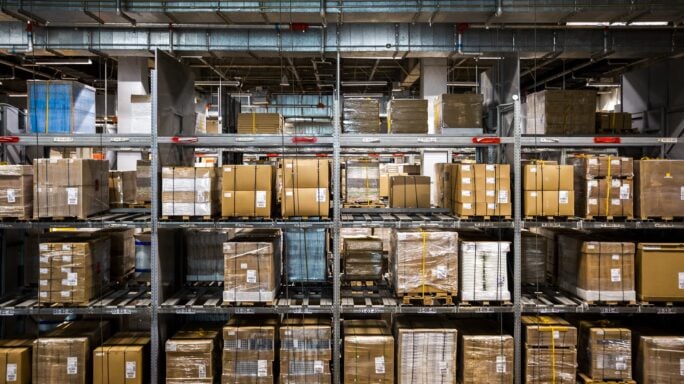Free guides and webcasts
Discrete manufacturers: say goodbye to supply chain headaches and hello to traceability

A new report from IDC says that 97% of discrete manufacturers will focus on visibility, with 60% concentrating their efforts on end-to-end traceability in their supply chain.
For discrete manufacturers—from makers of automotive, industrial machinery, and electrical components to those supplying medical and transportation equipment—supply chain challenges are increasing every year and becoming more of a daily concern.
Global pressures like environmental changes, tensions, and the challenges presented by coronavirus have shown manufacturers all over the world that their supply chains require improvement and a lot more visibility.
The main supply chain-related challenges out there today include increasing competition, the need to innovate, and rising customer expectations regarding the detail and quality of the information available to them.
Move beyond ERP with Sage X3
Take control of your entire business.
From supply chain to sales with Sage Business Cloud X3. Software for established businesses looking for greater efficiency, flexibility, and insight.

Visibility is key
An impressive 68% believe that a lack of supply chain visibility and flexibility will cause significant issues in the future if not addressed appropriately, and 50% say that supply chain visibility is a focus from a supply chain risk management perspective, compared to only 32% in 2018.
Traceability is not just about ensuring you are compliant—it is gradually becoming a way to differentiate yourself from the competition.
Here are five takeaways from IDC’s End-to-End Traceability in Discrete Manufacturing report, which you can keep in mind when coming up with supply chain strategies for your business.
1. Traceability—your supply chain track and trace
As your business grows, your commercial pressures and expectations are likely to increase. This puts strain on the supply chain, and by using the information to manage quality, inefficiency, and the threat of recalls, traceability is vital.
You often need to follow international standards for controlling quality and traceability, which impacts the sourcing of raw materials. Traceability identifies all relevant data for the materials used in the production and distribution of finished products—it is the tracking and tracing of your supply chain.
Tracking occurs when you can see how products progress from one sequence to the next and how they move through the manufacturing process through location data. Internally, you can see where products are, who has worked on them, and how long until they’re finished.
Tracing allows you to identify products through records and supply chain visibility, which lets you link products to their sources in the supply chain.
Good traceability is only possible if you effectively record information from manufacturers, suppliers, and distributors, and those systems covering different process steps are connected and integrated.
Apply traceability to your entire supply chain internally when it focuses on tracking the receipt and intake of raw materials to manufacturing processes and externally as you distribute the finished goods to their final destinations.
IDC’s research features 140 medium to large-sized organizations and shows that many discrete manufacturers have work to do.
- Only 50% of discrete manufacturers have officially automated traceability
- 42% still have manual processes in place.
2. The insight from traceability can improve your products
The key to curing those traceability headaches is to get to the root cause of any recurring issues in your current setup. Is it because of the product design, the components used, the assembly, the software deployed, or something else?
Once you figure that out, you need to make sure that discovery is shared with the right teams and loops back into the engineering process to fix the problem. But more importantly, this ensures continuous improvement of the product later down the line.
Traceability gives customers something valuable: information. Serving that detailed information is the key to building trust and ultimately enhancing brand value.
Whether B2B or B2C, customers expect quality and reliability in what they’ve ordered. When the product fails, has unexpected flaws, or doesn’t meet their needs, customers need quick, satisfactory replacements to limit the inconvenience on their side.
While recalls in discrete manufacturing are routine, and for the most part, voluntary, they have a long-lasting impact if the incident is severe enough. These cases commonly involve many products, reports of injury or even death, and extensive media coverage.
Prevent supply chain issues before they arise
Download this IDC report to learn how to adopt a proactive traceability strategy to lower costs and achieve competitive differentiation.

3. Prevent problems before they arise
Preventing a problem is better than going through the hassle of finding a cure if something goes wrong. Investing in digital traceability technology will give you what you need to take a proactive approach that ultimately adds value to your brand and the product your customers receive.
Enterprise application software gives you end-to-end visibility of operational processes, allowing you to download an entire product history as and when needed, from ingredients used to finished goods, taking into account multi-site, multi-company, and multi-legislative product journeys.
Accessible data across the product value chain lets you understand:
- Who supplied the raw materials
- Who validated the raw materials
- Which steps went into each process
- Who handled and signed off on the final product
- Who shipped and delivered the final product
- Who on the customer side validated the final product
With access to data across the end-to-end process, you can analyze the supply chain for insights and improvement in:
- Quality control
- Planning and scheduling
- Compliance
- Sizing quality and sustainability initiatives to the needs of individual markets
4. Increase the value of your brand with traceability
With product recalls, traceability is key to protecting both the consumer and your reputation. The standards around product safety and quality have never been higher—having consumer doubts surrounding your products could have a lasting effects on your brand value.
Use traceability to catch issues early, providing the visibility you need to get your manufacturing processes in top shape. Through end-to-end value chain traceability, you can show customers that you are a viable, trustworthy supplier and can offer the depth of information they crave.
So yes, investing in traceability is necessary from a regulatory perspective, but it’s also essential to understand that it can positively impact the long-term brand value of your business.
Today’s customers choose environmentally sustainable and ethical brands, and it’s traceability that can help you source materials that work for your business and work to support your ecologically conscious targets.
5. Traceability pushes businesses towards digital transformation
Traceability for discrete manufacturers demands real-time, pinpointed information. The pockets of siloed data in applications you have can be harnessed then and shared across your business with appropriate user permissions in place.
Becoming digitally mature means transforming your business into one that can compete better in an increasingly digital environment. Therefore, it’s advisable to continuously adapt and better handle traceability by digitizing your data and processes in digital transformation.
The very act of starting an end-to-end traceability journey gives your digital transformation program a boost, as it essentially helps to lay down a digital foundation.
Digital maturity puts you in an excellent position to fulfill quality, documentation, and traceability requirements. In addition, Digital supports end-to-end visibility, allowing you to optimize your supply chain and improve your customer experience.
The end message? You should drive your growth with a more significant commitment to traceability – driving value for money from crucial digital investments.







Ask the author a question or share your advice